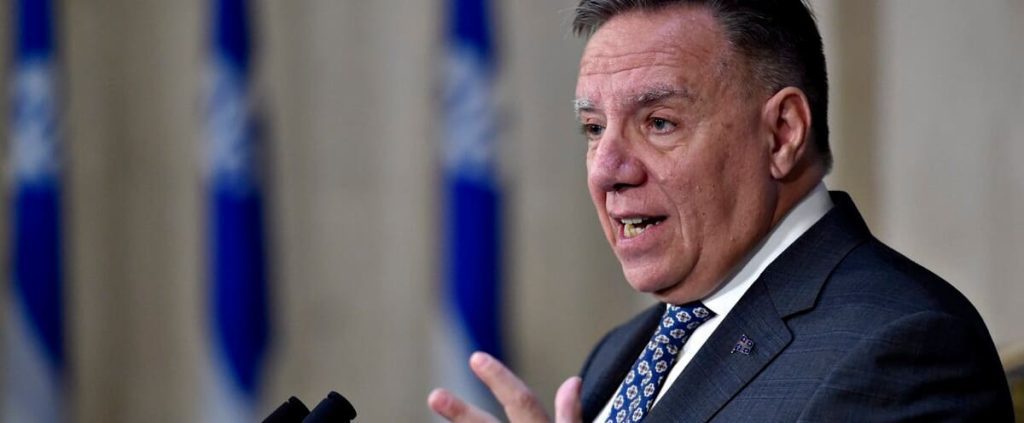
Additionally, the Legault government is weighing the possibility of changing its position on immigration thresholds in exchange for a federal guarantee that all newcomers are French-speaking.
• Also Read: Immigration thresholds: A new showdown between Quebec and Ottawa
• Also Read: Immigration thresholds: “potential disaster” according to Black MP
While Ottawa plans to welcome 500,000 people annually starting in 2025, François Legault and his ministers have argued publicly that Quebec can only welcome 50,000 immigrants a year.
But according to our information, other scenarios are being discussed internally, including agreeing to welcome more newcomers on the condition that all immigrants beyond the first 50,000 speak French. This view is not unanimous within the government.
Posture
When we sought an official comment on the matter from the Legault government, we were referred to comments made by Immigration Minister Christine Frechette during a Council of Ministers meeting last Wednesday.
Noting that it is up to Quebec to set the number of permanent immigrants it receives each year, Ms.me Frechette wondered “how is the government [fédéral] Reconciles the arrival of many immigrants with the need to ensure French survival in Quebec and […] In the rest of Canada.
That same day, the minister responsible for Canadian relations, Jean-Francois Roberge, for his part, emphasized the importance of receiving more of the French-speaking newcomers.
“Percentage of Immigrants [francophones] Definitely must grow in Quebec […]. “This issue is about the future of French in Quebec and Canada,” he said.
In the next few weeks, there will be meetings between Francois Legault and Justin Trudeau, between Christine Frechette and federal immigration minister Sean Fraser, as well as between Jean-Francois Roberge and his federal counterpart Dominique LeBlanc.
Every so often, the topic of immigration is on the agenda. Quebec’s goal during these negotiations was to make gains in immigration. CAQ approaches these exchanges from an “open position”.
Discussions
Quebec has little chance of making gains during eventual negotiations with the federal government on immigration, especially given the lack of common ground between the provinces.
“The Federation Council has just launched an advertising campaign to demand unconditional transfers in health, explained political scientist Felix Mathieu. They are not used to taking on more than one issue at a time.”
Unable to do more, the Legault government sought, through public outings, to further favor the balance of power opposed to the federal government — a balance of power that was still not tipped in its favor. , from the point of view of a political scientist.
Double vice
The federal Liberals’ plan would put the CAQ government in a double vice. “Quebec will not welcome more immigrants and its population weight will decrease […]Or he will follow the ball and he will face many important logistical problems, especially regarding the integration of these newcomers at the linguistic level”, Mr. Mathew underlined.
How can Quebec get out of this? “Ottawa can always accept Quebec terms in good faith, but is under no obligation to do so beyond what is indicated in the 1991 Canada-Quebec Treaty. […] Quebec controls 85% of immigrants.
These are the reasons underlying the Trudeau government project that Quebec is “not in an advantageous position,” according to a Canadian policy specialist.
“Ottawa is not pursuing this policy against Quebec, but for its vision of a multicultural and bilingual Canada. It contributes to its own project of national and identity building. “Except through tape, it comes against Quebec’s national and identity-building project,” he concluded.
Canada-Quebec Immigration Agreement
It serves to preserve Quebec’s population weight in Canada and ensure integration that respects the unique character of the province.
Canada sets national goals and is responsible for the admission of immigrants.
Quebec sets the number of immigrants who enter its territory. He is also responsible for selecting and integrating them.
*
From 1971 to 2021, Quebec’s population weight in Canada decreased by more than 5%, falling from 27.9% to 22.5%.
During the same period, Ontario, Alberta and British Columbia saw their importance increase by at least 3%.





More Stories
How List Acquisition Helps Your Political Campaign Become Successful
Four escaped cows were caught
A simple administrative decision? | Press